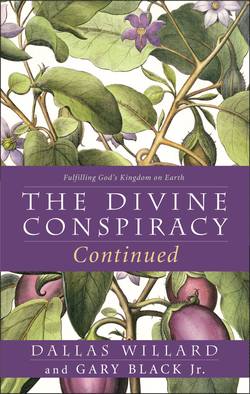Читать книгу The Divine Conspiracy Continued: Fulfilling God’s Kingdom on Earth - Dallas Willard, Dallas Willard - Страница 24
ISRAELITE LEADERS STRUGGLING WITH GOD
ОглавлениеThe biblical depiction of the state and people of Israel is a dramatic illustration of the shepherding leadership God sought to provide to the world. To demonstrate his glory, God saw fit to elect a once impoverished and enslaved flock to manifest what a people could become when their hearts were transformed toward the Shepherd’s ways. In God’s plan, the sons and daughters of Abraham (the Jewish ethnos, or “nation”) were commissioned to be his people, to be the community to which God would reveal himself and through which he would lead every people group on earth toward existential meaning, freedom from fear, and flourishing (Matt. 28:19).4
Sadly, the stiff-necked Israelites struggled, contended, resisted, and fought with God in God’s attempt to accomplish this objective.5 Their first and ultimate failure stemmed from their refusal to be consistently led by God alone. Instead, they wanted mediators, followed by human kings, and then rituals (Exod. 20:18–26; 1 Sam. 8:5–22). The prophetic response to these adaptations can be seen in Isaiah 1:11–17 and Jeremiah 6:20. God’s desire is not for sacrifices, priests, or kings. Instead, God’s pleasure was to be found in dwelling with humanity and abiding together as he led them into the experiential knowledge of his covenantal love. The inability to consistently be faithful to the covenantal relationship eventually led to Israel’s destruction.
Yet the great success of Israel, despite its difficulties, was the creation of a social basis that would provide the springboard for the gospel of Jesus in the first century. This is what biblical authors describe as “the fullness of time” (Gal. 4:4), the moment in history when an adequate reception of God’s revelation was possible and an advancement of the kingdom of God could proceed.6 It is when the Messiah is announced and presented to the world that the stark differences between the kingdom of God and human kingdoms begin to rise from the ashes of the shattered nation of Israel.7 During the last stages of Second Temple Judaism, God mercifully reintroduced the earth to the sweeping principle, the ideal, of an agape form of peace on earth. Such a proposition shook the foundations of human philosophy, psychology, religion, government, and law in ways and to degrees that have never been matched or reversed. First revealed to the ritually unclean shepherds, who were social outcasts living under the open stars, God’s heavenly messengers proclaimed the arrival of a new reality that had fallen upon the entire cosmos (Luke 2:10–14).
From the beginning of his life, Jesus faced significant obstacles to God’s pursuit of peace and goodwill. Today, many of these barriers remain and over the ages have only grown in breadth and depth. Primarily these hurdles center on the universal presence and experience of pride and fear, both of which are complicated and accentuated by individuals’ relation to their particular group, culture, and context. It is important to realize that, even for the first hearers of the gospel, the pronouncement created great fear. The shining of the “glory of the Lord” terrorized the “Christmas” shepherds tending their flocks by night, just as it threatened King Herod’s domination. This terror was, and is, well founded. Simeon the prophet predicted that the child Jesus was “destined for the falling and rising of many in Israel, and to be a sign that will be opposed so that the inner thoughts of many will be revealed” (Luke 2:34–35). Hearts being exposed, true motives revealed, kingdoms falling, rising, and resisting change—these predictions are indicators of world revolution. Fear and terror are often the preamble to changes in leadership, even benevolent change.
Just as Simeon predicted, the new wine of Jesus’s new leadership paradigm caused the old wineskin of Judaism to burst, and fear has been a part of the journey of the gospel through human agencies ever since (Luke 5:37). Conversely, the kingdom of God, led by his Christ, does not abide in the pride and fear that have so often characterized and fueled the structures and institutions of human societies. There is endless irony in God’s plan to lead the world back toward flourishing in his kingdom through the birth and death of a perfect human being, who was executed by God’s own chosen people, in concert with the power of the greatest civilization then known, using the highest form of moral law to condemn him to the worst form of human execution, all of which occurred in Jerusalem, the “city of peace.” Such hypocrisy exposes how fear wreaks havoc and eventually destroys even the best of human intentions and abilities. Fear must be done away with, especially in those endeavoring to lead as good shepherds.
The resurrection of Jesus marks the end of self-righteous, law-fixated religiosity advocated by much of the first-century Jewish leadership.8 In its place, the church became the new spiritual community, birthed from within Judaism as a continuing fulfillment of God’s promise to Abraham. Acts of the Apostles records the activities of two main leaders of this new movement, Peter and Paul. Both were Jews who were instrumental in the unfolding of God’s new universal community tasked with the identical overarching objective previously reserved exclusively for Israel. No longer would the kingdom of God be accessed exclusively through the Jewish faith. This wondrous new way of being and living was now available to all people. Whosoever will may come.
Unfortunately this lesson of open access to a new creation is still to be learned (Gal. 6:14–15). We now know that the early Christian community did not fully escape its cultural and intellectual captivity to Judaism. But in time the captor changed from Judaism to Roman and then Christian sociopolitical systems. The Jews eventually became as despised as their gentile neighbors, and the early leadership of the church struggled with cross-cultural and cross-religious integration.
